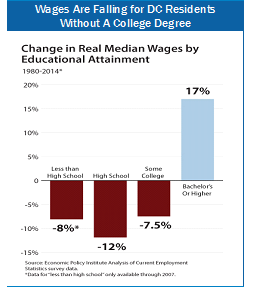Lots of DC residents are working hard, but not everyone is getting ahead. Wages for residents without a college degree have been falling since 1980, including drops in the last decade, according to a new report from the DC Fiscal Policy Institute. Meanwhile, job growth over the past 25 years has been concentrated largely in industries with high skill demands, such as education and professional services.
There are two broad approaches needed to change these trends — reforms to DC’s education and training programs, combined with policies that improve the quality of all jobs in the District, such as a higher minimum wage.
DCFPI’s report shows that wages for many DC residents are falling in the midst of ever-rising costs of living.
- High school graduates in DC have seen a large drop in earnings. The typical DC resident with a high school degree earned just $13 an hour in 2014, a decline of almost $2 since 1980, after adjusting for inflation. Residents without a high school degree also have seen wages fall.
- Wages are growing for college graduates: Meanwhile wages for residents with a bachelor’s degree or higher increased by $4.50 an hour, or 17 percent between 1980 and 2014.
The report also found that job growth in DC over the past 25 years has been greatest in professional an d business services and education’industries which generally require higher levels of skills and education. Meanwhile, industries that generally do not require higher level skills’such as manufacturing and trade’have been in decline. Hospitality and certain health care service jobs are two notable exceptions’these jobs generally do not require high skills, but have increased substantially since 1990.
d business services and education’industries which generally require higher levels of skills and education. Meanwhile, industries that generally do not require higher level skills’such as manufacturing and trade’have been in decline. Hospitality and certain health care service jobs are two notable exceptions’these jobs generally do not require high skills, but have increased substantially since 1990.
Wages Are Falling for DC Residents Without A College Degree
The employment challenges facing many DC residents highlight the importance of improving adult education and training services to meet the needs of DC residents and employers. Residents should be able to gain the initial skills needed for entry-level work, and then have access to continuing training opportunities to support career enhancement. This approach is envisioned by recent federal law, the Workforce Innovation and Opportunity Act (WIOA). WIOA offers an opportunity for the District to revamp its workforce development system. DCFPI looks forward to co-hosting (along with DC government and other non-profits) a November 13 discussion of how to develop a strong workforce development plan under WIOA. (Stay tuned for more details.)
DCFPI’s report highlights successful programs operated by local nonprofits, including a culinary training program at DC Central Kitchen and a medical administrative assistant training program at So Others Might Eat (SOME). Both programs work with residents that have limited work experience and skills, boast high job placement rates, and wages above the minimum wage.
DCFPI’s report also calls for steps to improve the quality of jobs of all people who work in the city. This includes increasing the minimum wage, requiring employers to give workers advance notice of their weekly schedules, and creating a system to provide paid family leave to workers who take time off with a new child or with an ill relative.
To print a copy of today’s blog, click here.
